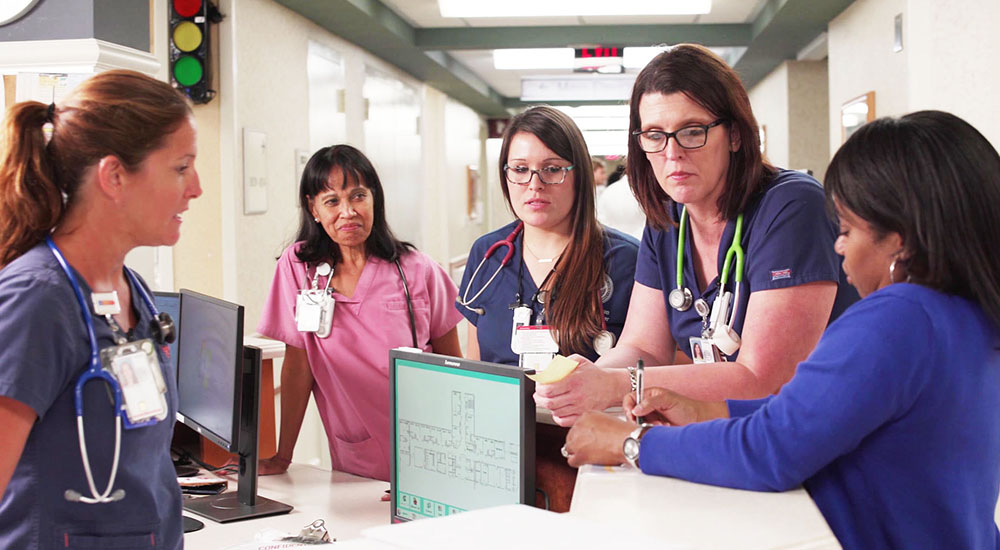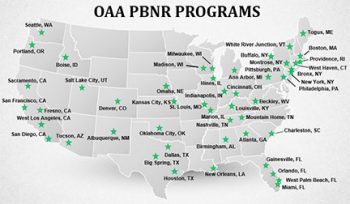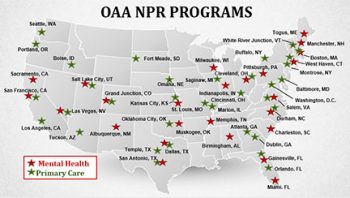VA’s Office of Academic Affiliations (OAA) will add 28 new nurse residency programs in academic year 2021-2022. The addition will help address one of VA’s – and the nation’s – most critical health care occupation shortages.
The programs include one year of in-depth training to further prepare the next generation of highly skilled nurse practitioners (NPs) and post-baccalaureate registered nurses (RNs).
The programs are designed for bachelor’s, master’s or doctoral prepared RN and NP graduates.
They include 14 new post-baccalaureate registered nurse residency (PB-RNR) programs, 10 primary care nurse practitioner residency (NPR) programs and four mental health nurse practitioner residency programs.
Expanded from 17 to 108 residency programs
Since 2018, VA has expanded nurse residency programs from 17 to 108 programs across the U.S.
For new RN or NP graduates, VA nurse residencies provide competency-based advanced training which helps them address the specific needs of Veterans in VA and the community.
Pictured above, VA PB-RNR and NPRs train new graduates in evidence-based Veteran-centric clinical practice. (Photo pre-COIVD-19.)
55% of VA’s 80,000 nurses currently eligible for retirement
Nurse residents participating in these federally funded programs benefit from 100% protected time to enhance their clinical and leadership skills.
“We are developing nursing trainees and providers who can take care of our Veterans inside and outside the VA system,” explained Jemma Ayvazian, the OAA director of Nursing Education.
Fifty-five percent of VA’s 80,000 nurses care eligible for retirement. Ayvazian sees nursing residencies as critical to fully prepare recent graduates for their roles in primary care, mental health and specialty areas such as ICU nursing.
“Our recruitment rate of nursing residents is over 90% which says a lot about how we train these trainees and their satisfaction with nursing in VA,” she added.
VA’s Post-Baccalaureate Registered Nurse Residency includes a robust competency-based curriculum aligned with the Commission on Collegiate Nursing Education (CCNE) accreditation standards.
Varied experience
New graduate nurses gain experience in evidence-based practices across a variety of VA clinical settings.
VA’s Nurse Practitioner (NP) Residency focuses on two clinical areas most in need of qualified providers: Mental Health NP and Primary Care NP. The curriculum is competency-based. It includes 80% of training time focused on advancement of clinical skills and 20% on enhancement of clinical knowledge.
The VA NP is designed with a Veteran-centric approach. The residencies are a bridge from strong academic foundations to develop competent NPs equipped with the knowledge and skills to successfully practice in today’s complex, fast-paced health care environment.
With the addition of the new nursing residency sites, VA will train 550 nurse residents in Academic Year 2021-2022. VA trains more than 25,000 nursing students each year.
Find out more about VA’s academic mission by watching this video and visiting the Office of Academic Affiliations recently updated website.
Tonya C. Lobbestael is the public affairs officer for the VA Office of Academic Affiliations.
Topics in this story
More Stories
Veteran Byron Potier weighed almost 300 pounds and was tired and lethargic. He was the perfect candidate for gastric sleeve surgery.
How much do you know about VA care, benefits and services? Don’t miss out on what you've earned—check out the "2025 VA Federal Benefits Guide for Veterans, Dependents, Survivors, and Caregivers" handbook to learn more.
Feeling stressed? Your breath can help you relax and focus. Take 3 minutes to reset and prioritize your well being for this week's #LiveWholeHealth practice.









Why aren’t these veterans being treated by physicians and why aren’t you expanding residencies for doctors? We have thousands of physicians that go unmatched every year, who have completed a significant amount of time refining their clinical knowledge and clinical skills before even entering their years long residencies. Are veterans not deserving of the highest quality care there is to offer a patient? What is the physician to NP ratio at these hospitals?